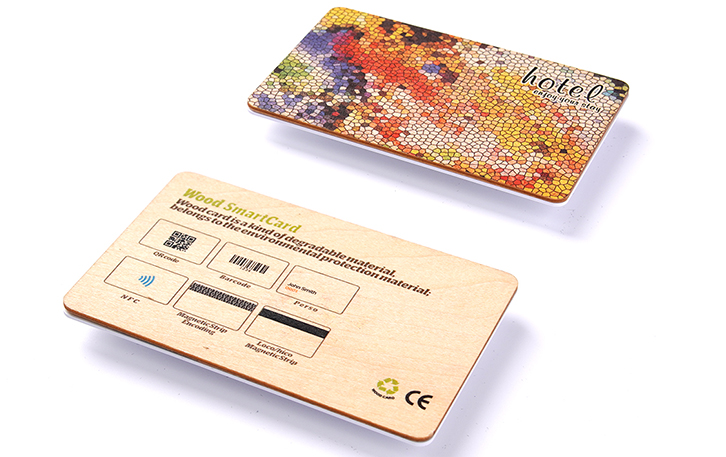Hot News
-
 2026 Year of the Horse Spring Festival Holiday Notice Feb 09,2026
2026 Year of the Horse Spring Festival Holiday Notice Feb 09,2026 -
 VIP Plastic Smart Card: A secure and flexible intelligent application solution Feb 05,2026
VIP Plastic Smart Card: A secure and flexible intelligent application solution Feb 05,2026 -
 The Synergy of RFID and barcodes: How Dual Authentication Works Feb 04,2026
The Synergy of RFID and barcodes: How Dual Authentication Works Feb 04,2026 -
 Polycarbonate ID Cards' Durability & Environmental Resistance Jan 29,2026
Polycarbonate ID Cards' Durability & Environmental Resistance Jan 29,2026
Green smart card: How can environmental protection and technology coexist ?
The membership cards, access cards, and transit cards in your hands may quietly be helping the Earth 'reduce its burden'! With rising environmental awareness, the smart card industry is also quietly becoming 'greener'—from card materials to chip energy consumption, it is exploring more sustainable development paths. Today, let's talk about green smart cards: How to choose eco-friendly materials? How do low-power chips save energy? How can your business enhance its brand image using 'green cards'?
1. Environmental materials: making smart cards more eco-friendly from production to disposal
The main green upgrade plans currently are:
- biodegradable PVC material
·Biodegradable PVC: By adding biodegradation agents, the cards decompose faster in specific environments such as industrial composting facilities, reducing soil pollution.
✅Applicable scenarios: short-term activity cards (such as exhibition tickets), eco-friendly enterprise membership cards (conveying brand responsibility).
- paper substrate plus waterproof coating
· Made from eco-friendly pulp as the base, with a waterproof and wear-resistant coating (such as eco-friendly resin) applied on the surface, it balances lightness and durability, and can be directly recycled or composted after disposal.
✅ Applicable scenarios: one-time event sign-in cards, short-term training certificates (low cost and easy to degrade).
2. Low-power chips: making cards last longer and consume less power
The 'lifespan' of an intelligent card depends not only on its material but also on the energy consumption of its chip. Low-power design can extend usage time, indirectly reducing resource waste.
- Low-power chip technology
·Modern IC cards/RFID chips extend their usage cycle by optimizing circuit design, such as reducing standby current and shortening signal transmission time, so that a single power supply (like the momentary current when inserting a contact card) can support longer use.
·The antenna efficiency of non-contact RFID cards, such as transit cards, has improved, allowing them to be activated by weaker reader signals and reducing energy loss.
- The inherent advantages of battery-free labels (passive RFID)
·Passive RFID tags operate entirely by 'wireless charging' from the reader's radio waves (as previously explained!), without any battery components. This eliminates both the pollution associated with battery production and the recycling challenges posed by discarded batteries.
3. The value of green smart cards: environmental protection plus brand win-win
On the environment: reducing plastic pollution, lowering carbon emissions (biodegradable materials have lower production energy consumption), saving raw materials (recycling and regeneration of cards).
For businesses:
·Enhance brand image — eco-friendly membership cards/staff cards can make customers feel that 'this is a responsible company';
·Align with policy trends — some countries and regions have already issued restrictions on plastic products (such as the EU's ban on plastics), and early planning for green cards can avoid compliance risks;
·Lower long-term costs — low-power chips reduce card replacement frequency, and biodegradable materials lower waste disposal costs.
4. Our green solution: customize your eco-friendly smart card
As a leading manufacturer of customized smart cards, we offer an end-to-end green solution: material selection, chip compatibility, and functional integration.
Want to make your smart card greener? Consult us for customization now and get a free copy of the 'Green Smart Card Selection Guide' plus sample testing!
-
 Design your card for free
Get Free Design
Design your card for free
Get Free Design -
 Free Sample Cards
Get Free Sample
Free Sample Cards
Get Free Sample -
 24 hours online service
Contact Us
24 hours online service
Contact Us-
Office Phone
+86 189-2893-5004
-
E-mail
mailto:denis@zfcard.com
-
Office Phone

 English
English Russian
Russian French
French Spanish
Spanish Portuguese
Portuguese Italian
Italian Arabic
Arabic German
German










